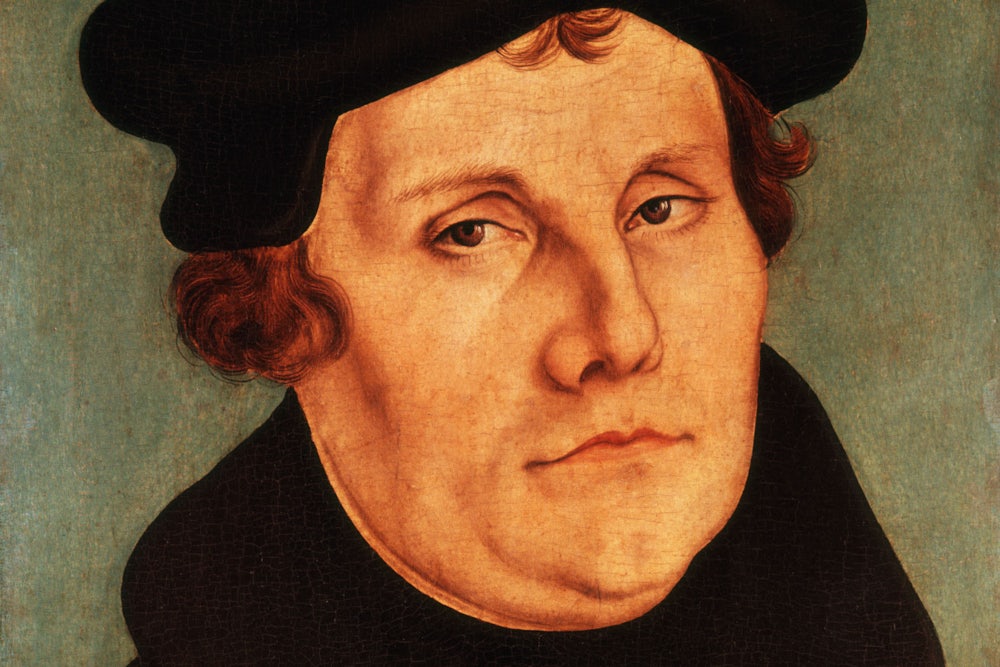In his 2011 book, The Origins of Political Order, Francis Fukuyama says, “The problem of creating modern political institutions has been described as the problem of ‘Getting to Denmark.’” He goes on to explain, “Denmark is a mythical place that is known to have good political and economic institutions: it is stable, democratic, peaceful, prosperous, inclusive, and has extremely low levels of political corruption.” He notes that international development experts hold up Denmark as a model for what they are trying to achieve in countries like Iraq and Nigeria—but that none of them knows the slightest thing about how Denmark became Denmark. He later offers a short account of that process, featuring this key sentence: “If there is a single event that sent Denmark and other parts of Scandinavia off on a distinct development path, it was the Protestant Reformation.”
In 1904–1905, the German sociologist Max Weber wrote his landmark essay The Protestant Ethic and the Spirit of Capitalism, in which he found the origins of the modern capitalist system in the Protestant work ethic promulgated by John Calvin and his disciples. Calvin liked what he saw of the nascent capitalism of his time, and he encouraged his followers to find a calling in the area of business. Under Protestant theology, everyone was supposed to perform strenuous labor in a calling, but not for the sake of attaining salvation, which could only come through the grace of God. Nor did Calvin preach that you were supposed to work in a calling to store up wealth for personal gratification. Your aim, rather, was to work for the glory of God, and to finance the expansion of your enterprise. Your fate in the afterlife was predestined in any case, and there was nothing you could do to alter it. But over time, Weber explained, the theology evolved, and eventually the attainment of significant wealth came to be interpreted as a sign that you were very probably among the elect—that is, those who would be saved from eternal damnation.
Robert H. Nelson, a professor of political economy at the University of Maryland, has written a book called Lutheranism and the Nordic Spirit of Social Democracy: A Different Protestant Ethic. Nelson argues, contrary to Weber, that there are actually two Protestant ethics, the original one espoused by Martin Luther, who sparked the Protestant Reformation, and Calvin’s revision of Luther’s theology, which over time came to predominate. Luther and Calvin were generally in agreement on the theological plane—both detested the Vatican for interposing itself between the individual person and God, for instance—but they held differing views on economics and politics. Unlike Calvin, Luther did not laud the market economy he saw gathering force around him. In fact, Nelson says, he was “often scathingly hostile to a market organization of society based on the self-interested pursuit of profit.” Nelson approvingly quotes the German sociologist Helge Peukert to the same effect: “Luther offered western societies a concept of a practical moral economy ... which is located in the interpenetration zone of economy and morals/religion. It is quite different from Weber’s protestant ethics.”
Luther and Calvin disagreed on the proper relationship between church and state. Luther demanded absolute subservience to the German prince by his flock, no matter how bad the prince might be. Calvin rejected any interference from the state in church affairs, and aspired to keep governments as small and weak as possible. Luther’s view of these issues is important because Denmark established a state Lutheran Church in the sixteenth century (as did the other Scandinavian countries). As Nelson tells it, the Danish kings basically governed the country through the apparatus of the state church, particularly at the lower levels. There was very little separation between church and state in Denmark. And Nelson contends that as Denmark became secularized at the end of the nineteenth century and the beginning of the twentieth, the Danish national church, and Lutheranism, were reborn in the form of Danish social democracy, which incorporated the basic social and economic values preached by Luther in a political form.
Surprisingly, Nelson credits the American Progressive movement of the early twentieth century with helping to propel the rise of social democracy in Scandinavia. He believes the Progressives were aiming at creating just such a system in the United States, but were ultimately stymied by the country’s underlying Calvinist suspicion of government and cult of the autonomous individual. Nevertheless, he credits the American Progressives not only for the reforms they accomplished themselves, but also for those of the New Deal and the Great Society. On this basis it is arguable that, for much of the twentieth century, the United States was on a slow but steady trajectory toward its own version of social democracy. Robert Putnam and Shaylyn Romney Garrett, in their book, The Upswing (which I reviewed in the October 2020 issue), advance just such a thesis, bringing to light the underlying communitarian values that prevailed in America from the Progressive era up to the 1970s.
New York Times columnist Nicholas Kristof visited Denmark before the Covid-19 pandemic, returning with a column entitled “McDonald’s Workers in Denmark Pity Us.” Kristof had informed a Danish McDonald’s worker that the highest aspiration of McDonald’s employees in America was to make $15 an hour; the worker was making the base rate of $22 an hour, with added benefits such as state-provided health insurance (which, incidentally, has helped keep the rate of Covid-19 infections in check there) and six weeks of paid vacation a year. “I feel for them,” the worker told Kristof.
“We are not Denmark,” Hillary Clinton said in 2015. “I love Denmark.” Indeed, we are not, but is there a creative, neo-Calvinist version of the Danish ideal to which we could aspire? There has been before.
